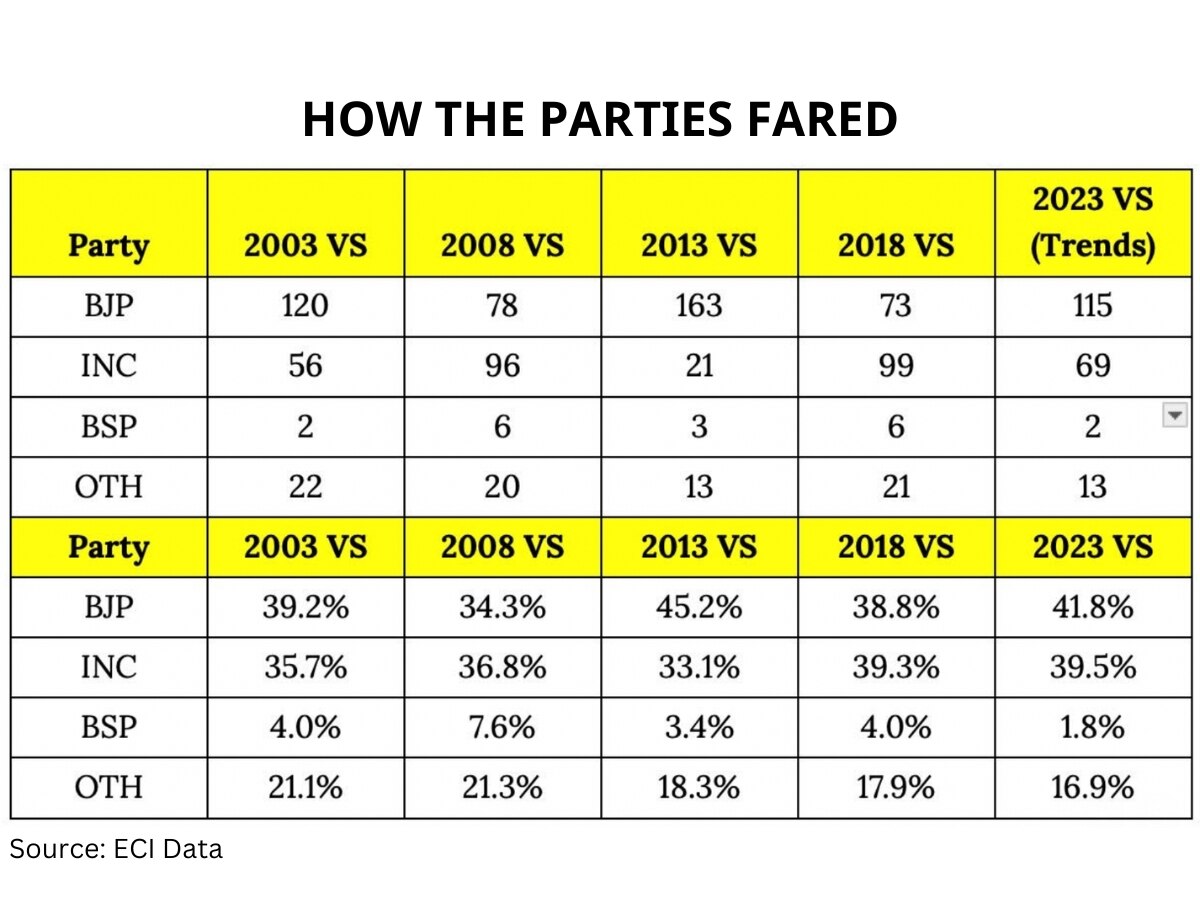When BJP Wins Rajasthan, It Wins Big. But This Victory Is Not One Of Its Best
[ad_1]
Rajasthan Results: The Bharatiya Janata Party (BJP) clinched Rajasthan from the Congress as the state stayed true to its tradition of not bringing back the incumbent government. The party won 115 seats out of the 199 where polling took place, against the Congress’ 69, with regional parties bagging seven seats and independents eight.
While the BJP has recorded 42.05% vote share, the Congress is not far behind with a vote share of 39.28%. Chief Minister Ashok Gehlot gave a tough fight to the BJP. When the BJP wins Rajasthan, it wins big, and when Congress loses, it loses badly. This is often said about the state, pointing to 120 and 163 seats for BJP in 2008 and 2013, respectively, against the Congress party’s 56 and 21. However, the BJP is not seen sweeping the state this time, with Gehlot putting up a decent fight with a 0.2% increase in vote share.
Ashok Gehlot Did Not Go Down Without A Fight
Ashok Gehlot understood that there is anti-incumbency against his MLAs and attempted to convert the election into a Modi versus himself battle, as he was not unpopular. This worked to some extent, neutralising the local-level anti incumbency. Congress won 14 out of 21 seats in Shekhawati, a flip region that usually swings from one party to another in line with the state trend. However Gehlot has managed to hold on to this region where the party won 15 seats in 2018 mostly due to the fact that this was the epicentre of farmer protest in 2019.
Gehlot’s tribal outreach and schemes for the ST community seems to have worked, especially free food packets under Annapurna scheme. The party got 10 out of 22 seats reserved for ST — a loss of just 2 seats compared to 2018. The party has retained control of the Meena belt too despite BJP pushing Kirori Lal Meena to contest despite him being a Rajya Sabha MP. The party bagged 14 seats, down from 15 in 2018.
CM Gehlot launched a slew of schemes ranging from Chirnajeevi to Urban NREGA (National Rural Employment Guarantee Act) to smartphones, and free electricity, thereby catering to women, the youth, the farmers, and the poor. This may have clicked with a section of voters. Gehlot was also leading the CM ratings at 32 percent followed by Baba Balaknath at 10 percent. Gehlot converted the elections into a presidential contest, thus making it a Gehlot vs Modi contest. The promise of Old Pension Scheme also seemed to have worked with the government employees in the urban pockets, as also the urban NREGA.
The party has not done as badly in urban seats, leading in 10 seats — a loss of 7. To neutralise the impact of loss of Gujjar votes, Gehlot has worked on consolidating the Mali vote, from the community he hails.
The author is a political commentator and SEBI-registered investment advisor.
[Disclaimer: The opinions, beliefs, and views expressed by the various authors and forum participants on this website are personal and do not reflect the opinions, beliefs, and views of ABP Network Pvt. Ltd.]
[ad_2]
Source link